CRIER CRIER





By CARL APPEN carl@appenmedia.com
SANDY SPRINGS, Ga. — A Sandy Springs police officer has resigned after allegedly using the city's Flock camera network to help develop a surveillance product for a company where he works, according to interviews and documents obtained by Appen Media. Public records show Francis Michael Esposito had been with the Sandy Springs Police Department since 2016. According to an internal affairs report
and other materials obtained by Appen Media, he resigned in August amid a department investigation into his alleged use of city-leased software to help improve commercial data platform Signal 8.
The Sandy Springs Police Department uses products from Flock Safety, an automated license plate reader and security software company based in Atlanta. The firm’s technology identifies and logs vehicles moving through town to assist police with criminal investigations.
Flock users can perform searches of identifying information – such as license plate numbers or descriptions – to help locate vehicles they suspect are connected to criminal activity. When departments make these queries, they can search certain
By HAYDEN SUMLIN hayden@appenmedia.com
ATLANTA — Sandy Springs candidates fought through Buckhead traffic to reach WSBTV’s studios in Midtown to tape a mayoral forum focused on the key issues affecting the city’s more than 107,000 residents.
WSB News anchor Linda Stouffer moderated the forum, which featured questions posed to candidates from Sandy Springs residents,
Rough Draft Atlanta reporters and from the mayoral hopefuls to one another.
The taped Sandy Springs mayoral forum is available at wsbtv.com.
Stouffer framed the key issues as centering around public safety, stalled redevelopments of commercial areas, transparent government and traffic congestion.
Each candidate lobbed criticism at Paul and his 12-year tenure in office.
FORUM, Page 21
databases of other agencies as well, tapping into a nationwide network of sources.
The platform also allows agencies to set up lists of vehicles to monitor, getting alerts if they appear in the network.
Flock says its system “is trusted by more than 5,000 communities across the country…” That figure includes all 10 of the cities and counties Appen Media covers in north Metro Atlanta.
Esposito joined the Sandy Springs Police Department in 2016 and was promoted to sergeant in 2021, according to public records obtained by Appen Media.

Atlanta.

NEWS TIPS
770-442-3278
AppenMedia.com
319 N. Main Street Alpharetta, GA 30009
HANS APPEN Publisher CONTACT
Contact reporters directly or send story ideas to newsroom@appenmedia.com.
Send your letters, events and community news to newsroom@appenmedia.com. See appenmedia.com/submit for more guidance.
ADVERTISING
For information about advertising in the Sandy Springs Crier or other Appen Media properties, email advertising@appenmedia.com or call 770-442-3278.
CIRCULATION
To start, pause or stop delivery of this newspaper, email circulation@appenmedia.com or call 770-442-3278.




Continued from Page 1
While employed as a Sandy Springs officer, Esposito began working for Canton-based Signal 8, a public safety software startup founded by former Sandy Springs Police Detective Brandon Puhlman, according to their LinkedIn profiles and other public materials.
Signal 8 connects “multiple systems in one interface to reduce time spent on administrative tasks” and help officers deploy quickly, according to its website.
Puhlman, who served with Sandy Springs Police from 2017 to 2021, did not respond to interview requests for this story. Esposito also did not respond.
Earlier this year, Esposito used his Sandy Springs Police credentials to conduct searches in the Flock network for the purpose of informing Signal 8 algorithms, according to a police internal affairs report obtained by Appen Media.
The report alleges Esposito searched Flock for license plate numbers belonging to himself and other employees of Signal 8 along with their families.
“Additionally, there were other entries identified relative to the same dates and reasons, but the names and vehicles could not be definitively identified,” as tied to Signal 8, it noted.
The report also alleges Esposito made searches for the personal license plate number of a fellow Sandy Springs officer.
Esposito’s Flock queries were not made for law enforcement purposes, but instead “for the benefit of a private company for which he was employed,” the investigation alleges.
According to the internal affairs report, data gleaned from the searches was used to inform and

Appen Media will continue to cover the story. Send questions, tips and responses to newsroom@ appenmedia.com.
improve the Signal 8 platform.
Sandy Springs Police officials also sent a letter to Flock Safety, which Appen Media obtained, alerting them to the allegations. In it they write that Esposito, “was utilizing his Sandy Springs Police Department Flock login to obtain Flock Camera data for commercial purposes to validate beta data for a product for a company identified as Signal 8.”
Esposito was under investigation for the alleged actions when he resigned in August.
However, Sandy Springs officials say they consider his exit a termination. The reason, they told Appen Media, is because Esposito allegedly refused to answer questions during the probe.
“Frank Esposito was recently terminated after he failed to cooperate during an internal affairs investigation into possible misconduct,” Sgt. Leon Millholland told the newspaper.
In September, Sandy Springs sent Esposito a letter, obtained
by Appen Media through a public records request, informing him the investigation had, “concluded with sustained findings of violations of department policies: Abuse of Position and Authority; Common Sense and Judgement; Conduct Unbecoming.” The notice also stated that Esposito’s status, “is officially classified as Terminated, effective August 20, 2025.”
Appen Media also learned Esposito was not an activeduty officer during the time he conducted the alleged Flock searches, according to state, city and other records obtained by the newspaper.
The internal affairs report alleges Esposito made the license plate inquiries from January to April.
According to his personnel file and state records, Esposito resigned from his full-time post with Sandy Springs Police and joined the department’s volunteer Reserve Unit in January.
“Reserve SSPD officers are unpaid sworn officers that volunteer 10 hours a month with the department,” Millholland said. “All Reserve SSPD officers have the same access to department resources and must adhere to the same policies and standards as full and part-time sworn officers.”
Appen Media asked Flock for its reaction to the allegations.
“Upon learning of the situation last month, Flock promptly addressed it directly with Signal 8,” Flock Safety Communications Officer Josh Thomas said.
Managing Editor Pat Fox, Staff Reporter Annabelle Reiter contributed reporting.


Join us for our 13th Annual

Blessed Trinity High School Main & Aux Gym
11320 Woodstock Road
Roswell, GA 30075
Saturday, Nov. 8th – 9am – 5pm
Sunday, Nov. 9th – 10am – 3pm
Over 110 vendors with a large variety of unique and beautiful gift items –Jewelry, Wreaths, Pottery, Fine Art, Holiday and Home Décor, Accessories, Knits, Children’s Items, Huge Bake Sale and much more!
• Tons of parking
• All booths are indoors
• Enter our Titan Tidings Raffle to win prizes
• Concessions will be available
• No Strollers Please
• $5 Admission

SANDY SPRINGS, Ga. — Two sitting Sandy Springs City Council members, Jody Reichel and Andy Bauman, announced mayoral campaigns earlier this year, challenging the incumbent Mayor Rusty Paul, who is running for a fourth term.
The fourth mayoral candidate is Dontaye Carter, CEO of his own public relations and media firm, who received just over 30 percent of the vote as the sole mayoral candidate running against the incumbent Paul in 2021.
The deadline to register to vote was Oct. 6. Advanced voting will occur Oct. 14 to 31.
Check your voter registration status and find more information at vote.gov.
After soliciting input from residents, Appen Media and the Sandy Springs Crier sent questionnaires to the candidates. They were asked the same questions and given equal amount of space to provide answers.
Readers can see their responses below.
A big topic in Metro Atlanta right now is the rising cost of living and a shortage of affordable housing. What role, if any, should Sandy Springs city government have in


promoting or restricting more affordable housing types, which may include multi-unit developments?
BAUMAN: Sandy Springs must remain a community where first responders, teachers, nurses, and longtime residents can afford to live. I led the creation of our first responder housing program, repurposing surplus city homes for affordable housing. As mayor, I’ll expand that model and support redevelopment that strengthens neighborhoods and schools. Dense growth should be targeted near transit and job centers, while established single-family neighborhoods with limited infrastructure are not suited for significant density increases.
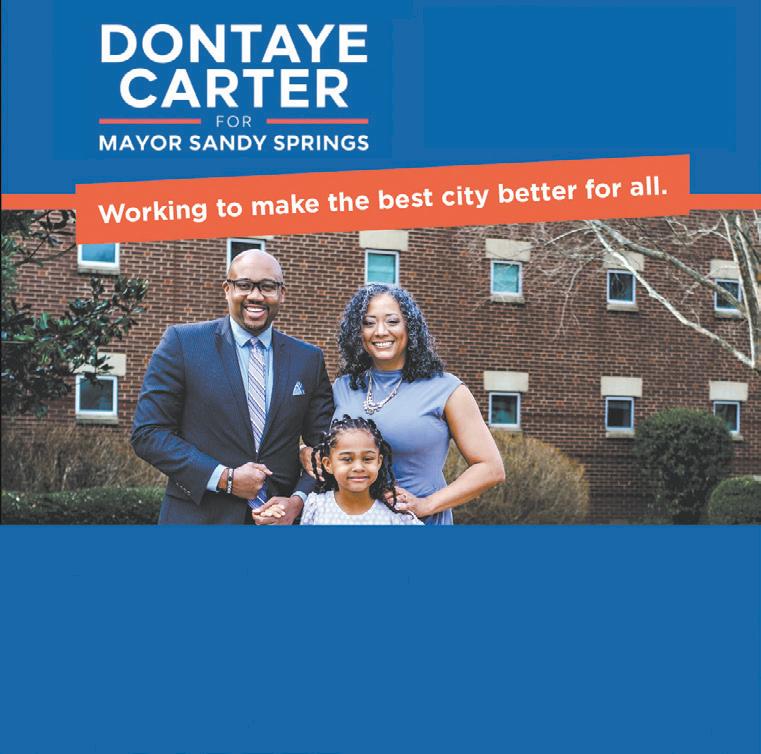
Protecting neighborhood character while creating pathways for new housing near transit nodes is the right approach to ensure our city stays inclusive and sustainable.
CARTER: The rising cost of living threatens to push families out of Sandy Springs. Our city must support a variety of housing options—multi-unit developments, townhomes, senior housing, and starter homes—so residents at every stage of life can remain here. I will also champion pathways to homeownership programs that give renters the tools and resources to build equity and stability. To fund these initiatives, I’ll propose Tax Allocation Districts (TADs), ensuring growth pays for itself by reinvesting future tax revenues into affordable housing and infrastructure. My first 100 days will include forming a Housing Advisory Council to drive these solutions.
PAUL: Affordable rental units are less a problem than creating ownable housing that young families can afford. This is due to: 1) land costs; 2) labor costs, 3) interest rates and 4) lack of undeveloped land. Complicating that effort is Sandy Springs’ popularity as a residential community leads wealthier individuals to buy the affordable units, replacing them with high-end residences. We are encouraging more townhomes and condos to create more affordable family housing for a wider income range and give families the opportunity to build equity which is the greatest source of family wealth in the US.
REICHEL: When people talk about affordable housing, definitions matter. In Sandy Springs, we do not have a shortage of apartments; we have 26,000, with another 2,000 under construction, more than the combined total of Roswell, Alpharetta, and Johns Creek. Over half of our residents rent, yet the real shortage is affordable homes to buy. Families and young professionals need starter homes so they can put down roots and build equity. City government should encourage redevelopment that creates more owner-occupied, for-sale housing rather than adding more rental complexes. Strong neighborhoods are built on homeownership, and that is how we keep Sandy Springs strong.
BAUMAN: Although the city doesn’t control schools, we have an important role to play in supporting them. I’ve partnered with parent groups to improve safety and accessibility
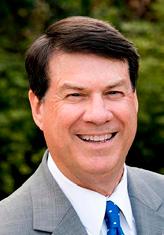
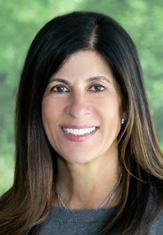
around campuses, including sidewalk connections that help kids walk safely to school.
As mayor, I will continue working with Fulton County Schools and parent advocates to ensure our students learn in safe, modern facilities.
I’ll also push redevelopment efforts that strengthen neighborhood schools by stabilizing enrollment and expanding opportunities for families. Great schools benefit every resident, regardless if you have children, because strong schools sustain property values, attract families, and build stronger neighborhoods.
CARTER: While the city doesn’t directly fund schools, we have a duty to support them. Strong schools require strong, stable communities, yet in the last four years some neighborhoods have lost nearly 30% of their population. If young families can’t afford to live here, we can’t expect schools to thrive or even remain open.
That’s why I’ll focus on housing policies that keep families rooted in Sandy Springs. I’ll also prioritize safe infrastructure around schools— because too many areas near classrooms lack basic sidewalks. Supporting our schools means supporting the families, housing, and neighborhoods that give them life.
PAUL: Since the Georgia Constitution bars Sandy Springs or any other Georgia community from creating a new school system, the best approach is supporting parent directed charter schools. A change in state law allows parents to bypass the local school system to obtain a state charter to create a new school funded with state and local revenues. Since the school superintendent continues blocking parent purchase of Spalding Elementary, I’m working with those parents to find a suitable facility to create that locally operated school. I fully support the parents who want to preserve a high performing school in their neighborhood.
Continued from Page 4
REICHEL: A strong education is the most important gift we can give future generations. Creating the ability for municipalities, including Sandy Springs and other metro cities, to establish municipal school districts is a priority. I’ve been working with a legislative attorney on how it can be done, and it can be done. Sandy Springs has 10 schools and approximately 8,800 students. Research shows smaller districts deliver stronger results, and Sandy Springs deserves that advantage. I led the effort to secure North Springs High School, proving that with persistence, we can achieve what others said was impossible. Our children deserve nothing less.
This seat will serve for four years. What do you anticipate will be the city’s biggest obstacle during that time, and how would you approach it as an elected official?
BAUMAN: The biggest challenge will be balancing growth with affordability while keeping taxes in check. Rising property assessments are pushing residents out, and our redevelopment of aging corridors is overdue. At the same time, traffic congestion remains one of voters’ top frustrations. My approach is results-driven: protect homeowners from steep tax hikes, expand housing options responsibly, and prioritize infrastructure that actually reduces congestion. I’ve built a reputation as a problem-solver who listens and delivers. As mayor, I’ll tackle these challenges with urgency and transparency so Sandy Springs remains a city for all.
CARTER: Our city has done an excellent job of attracting corporations, but they’ve brought employees—not jobs for local residents. Too many of those employees can’t afford to live here, which drives congestion on our roads. At the same time, much of our infrastructure—roads, pipes, and drains—needs major reinvestment or replacement. The biggest obstacle over the next four years will be balancing growth with infrastructure renewal. As mayor, I’ll push for smart development tied to Tax Allocation Districts (TADs) that fund repairs, expand housing options, and ease congestion, ensuring Sandy Springs remains livable for families, businesses, and future generations.
PAUL: I don’t see obstacles, but we have plenty of opportunities. We can create a more walkable, interconnected city center with more shops and restaurants. Regarding City Springs
2.0, the capital markets have been challenging, but that is changing. The north end was slower to redevelop than I hoped. So, I’m proposing a Tax Allocation District that freezes commercial assessments for regular taxation, but uses taxes from the future appreciation for infrastructure, stormwater, parks, trails and other amenities either by the city or working with the development industry to foster projects that will add shops, restaurants and other attractions that area deserves.
REICHEL: The biggest obstacle over the next four years will be whether Sandy Springs moves forward or remains stuck in the status quo. Our North End and downtown have enormous potential, but without vision and active leadership, we will continue to fall behind neighboring cities that are thriving. The challenge is not an opportunity, but a direction. With the right leadership, Sandy Springs can attract investment, complete City Springs Phase 2, and redevelop aging properties into vibrant neighborhoods with a higher percentage of owneroccupied housing. That is how we build a stronger future for our residents. Without it, we risk losing ground.
Question: In April the city passed a series of ordinances affecting ways residents and visitors can interact. The votes occurred after legal concerns about the laws had been raised by residents, the ACLU and others, including this newspaper. The following month the city repealed one of those ordinances. For those not currently in office: From your position as a resident, how did that experience inform the way you would govern if elected?
Jody Reichel and Melody Kelley: You voted against the buffer ordinance, in the minority, in April. Other council members later moved to your side when the city repealed it. What do you think sets your decision-making process apart from the other incumbents?
Rusty Paul, Andy Bauman, Melissa Mular and John Paulson: You supported the buffer ordinance after legal concerns had been raised. If elected in November, will you take a different approach to evaluate the lawfulness of city actions?
*Editors note: Rusty Paul did not vote in favor of the ordinances or the later repeal; the mayor typically only votes to break ties. When the ordinances first came before the City Council in January, City Attorney Dan Lee said it was at the behest of Rusty Paul.
BAUMAN: The ordinance debate highlighted how complex issues become when public safety and constitutional rights intersect. Groups

Hear more
Candidates for mayor sat for interviews on the Georgia Politics Podcast, a show produced by Appen Media. Listen on Spotify, Apple or appenmedia.com/podcasts.
like the ADL raised important concerns about protecting residents, while the ACLU and local media raised legitimate constitutional questions. Balancing those values was difficult, and the process left me uneasy even as I voted for the buffer ordinance. When it became clear the ordinance was not legally sound, I supported its repeal. As mayor, I will require stronger legal
review, more public input, and clear communication with stakeholders. My goal is to ensure laws are effective, lawful, and respectful of community trust.
CARTER: I was disgusted when City Council passed an ordinance that criminalized free speech. It was reckless, unconstitutional, and revealed how disconnected our city leadership is from the community.
Sandy Springs is a diverse city, yet too often voices—especially those from marginalized groups—are ignored. The ACLU warned the city. I, along with many other community leaders, used our platforms to raise awareness about this atrocity. Weeks later, Council was forced to repeal it—not because they listened, but because public backlash left them no choice. Leadership means protecting rights the first time, not silencing voices and backtracking later.
PAUL: The growth of antisemitism is disturbing. Recently, heinous flyers and other intimidation activities were directed at Sandy Springs. ADL approached me with court-tested ordinances to better cope with these situations. The buffer ordinance assured protestors’ right to protest, but not interfere with access to synagogues, schools and other publicly accessible buildings.

Together, we’ll create opportunities, drive innovation, and build a brighter tomorrow YOUR VOICE. YOUR BUSINESS. YOUR SUCCESS. YOU ARE WHAT MAKES US GREATER.

Memberships is now opendon’t miss out on this exciting new chapter! today and become part of a dynamic network that’s shaping the business landscape
Continued from Page 5
A council member had concerns about the buffer distances, so our city attorney made a change, a change which introduced unintended consequences. Once discovered, ADL, our legal team and the police leadership determined that adequate protection exists in other ordinances, so we simply revoked that ordinance. The other ordinances remain in effect.
REICHEL: My decision-making process is guided by listening, research, and principle, not politics. When the buffer ordinance came before us, legal experts and residents had already raised valid concerns that it infringed on First Amendment rights. I studied the issue, weighed the risks, and concluded the ordinance was not in the best interest of Sandy Springs. Even though I was in the minority at the time, I believed it was essential to stand by that judgment. I do not vote to go along with the crowd; I base decisions on facts, resident input, and what is best for our city.
What amenities and/or services are lacking in Sandy Springs, or your specific council district, if any? How would you approach helping if elected?
BAUMAN: Sandy Springs lags behind peer cities in parks and recreation. Families, seniors, and young people deserve modern facilities, more trails, and expanded programs. I will prioritize upgrading existing centers and athletic fields, expanding greenways, and ensuring every resident lives within a 10-minute walk of a shaded public
space.
CARTER: As mayor, I will work to ensure every resident has access to safe sidewalks, updated drainage, and the recreation opportunities our families deserve. A new recreation center would fill critical gaps in wellness, fitness, and community gathering spaces. Investing in these amenities means investing in the daily lives of our residents.
PAUL: We need sidewalks and other walkable connections within and between neighborhoods and amenities. Under Fulton County, sidewalks were not required as the area developed. We are now addressing that oversight, retrofitting them as resources allow. We have come a long way, but we have much further to go.
REICHEL: We need a vibrant downtown, redevelopment of the North End, more soccer fields, Friday night lights for our schools, and a first-class dog park. I also want to see more pickleball courts, trails, and community gathering spaces so residents of all ages have places to play, connect, and enjoy life in Sandy Springs. How has Sandy Springs managed its relationship with the Fulton County Board of Commissioners, and in what ways can the city do a better job working with those officials?
BAUMAN: Our relationship with Fulton County has been strained, particularly with the justice system’s delays. I’ll prioritize collaboration—pressing for reforms at the courthouse, while working constructively with commissioners to improve regional services like transit, roads, and public safety. Partnership, not finger-pointing, will get results for our residents.
CARTER: Our strained
• Early voting for the upcoming municipal elections is Oct. 14Oct. 31. The polls will be open Monday through Friday from 7 a.m. to 7 p.m., Saturday from 9 a.m. to 6 p.m., and Sunday from noon to 5 p.m.
• Election Day is Nov. 4.
• The deadline to register to vote was Oct. 6.
• The last day to request an absentee ballot is Oct. 24.
Check your voter registration status at mvp.sos.ga.gov/s/
count on safe, well-maintained apartments, rental homes, and neighborhoods. Property owners must be held accountable, and when they neglect upkeep, the city has the authority to fine them. Families deserve clean, secure places to live.
PAUL: The problem in code enforcement is not city staff, but the legislature’s restrictions on our ability to address bad situations. Citizens expect a broader range of corrective steps than state law allows us. Its frustrates our residents and us when chronic conditions linger for months and years because state law bars the city from taking curative action.

relationship with the Fulton County Commission has limited funding and collaboration, hurting residents who rely on transit, housing, and infrastructure improvements. As mayor, I’ll rebuild that partnership with a focus on delivering real results. Working with all levels of government ensures our families get the resources they need.
PAUL: Our relationship with Fulton County overall is better than in the early years. Communication and responsiveness is good while cooperation and collaboration is at an acceptable level. Tensions exist, but they are normal ones in city/ county relations. The jail and the pace of criminal prosecutions remain a concern.
REICHEL: The city’s relationship with Fulton County was contentious during the LOST negotiation; the conflict hurt our city. When I spoke at the millage rate meeting, the commissioners listened. Collaboration delivers better outcomes, and as mayor, I will lead with respect so residents benefit from stronger services and representation.
would you work with city staff to improve code enforcement?
BAUMAN: Code enforcement must be consistent and fair. I’ll direct staff to focus on neglected properties and stalled retail centers, especially in the North End. By combining technology with neighborhood-based enforcement, we can improve responsiveness and accountability while supporting residents and small businesses working hard to maintain their properties.
CARTER: As mayor, I will work closely with city staff to strengthen code enforcement so residents can
REICHEL: I am a strong supporter of code enforcement because it protects neighborhoods and residents, keeping our city safe and attractive. I will work with staff to establish clear standards, provide the necessary resources, and ensure consistent enforcement, so that all residents and businesses are held equally accountable.
Imagine you got a free pass to hire a new city staff member, who was the best in their field, with no financial impact from their salary. It could be creating a new role or adding to the ranks of an existing team. What would that position or department be and why?
BAUMAN: I would hire a Director of Housing and Neighborhood Revitalization. This position would focus on creating affordable housing options, supporting redevelopment of aging corridors, and ensuring longtime residents aren’t displaced. With expertise and dedicated leadership, Sandy Springs can balance growth with stability and strengthen every neighborhood’s future.
CARTER: I’d hire a Chief Housing Officer—an expert focused solely on affordable housing, renter protections, and smart development. This role would lead partnerships with developers, track accountability, and ensure residents’ voices guide housing policy. Having a dedicated champion for housing ensures Sandy Springs tackles affordability with urgency and innovation.
PAUL: I would bolster our ability to harness artificial intelligence to expedite routine tasks and improve overall organizational efficiency, effectiveness and customer service, particularly in permitting.
Permitting is typically a laborintensive process where planners pour over complex or even simpler plans to ensure code compliance. AI can really help that function.

Kitchen Tune-Up
Paint Cabinets
New Countertops, Sink & Faucet
New Backsplash
Cut Down 2-level Island
Bathroom Tune-Up
New Countertops, Sink & Faucet
Enlarge Shower Shower Glass Shower Safety Full Remodel
Kitchen Remodel
Total Cabinet Replacement
Large Island
Optimize Cabinet / Appliance Locations
Open Concept –Move Walls

OPEN SATURDAYS
9-5 Mon-Fri • 10-4 Sat
Showroom – Design Center 10591 Old Alabama Rd. Connector Alpharetta, GA 30022 (near Northpoint Mall)
Bathroom Remodel
New Larger Shower
Vanity Replacement –Cabs, Counter, Sink
Free Standing Tub
Floor Tile, Wall Tile
Plumbing Fixtures

Please provide a brief profile that is 50 words or less.
CONNOR: I’m Lorri Connor, an experienced teacher with 30+ years in Georgia classrooms, including 10 in Fulton County. A Sandy Springs resident since 2010, I’ve devoted my life to civics and community. District 1 deserves fresh energy and vision after 16 years of missed opportunities.
PAULSON: I am a Chicago native, moving to Sandy Springs in 1986 where Mary and I raised two children and have 4 grandchildren. I am a Marine Vietnam Combat veteran, who afterward became a registered professional geotechnical engineer for 50 years. John has served as Councilman of District 1 since 2010.
A big topic in Metro Atlanta right now is the rising cost of living and a shortage of affordable housing. What role, if any, should Sandy Springs city government have in promoting or restricting more affordable housing types, which may include multi-unit developments?
CONNOR: Sandy Springs can’t ignore the regional housing crisis. Rising rents and home prices push out teachers, first responders, young families, and seniors. City government should play a proactive role by balancing neighborhood character with the urgent need for affordability. That means encouraging well-planned multi-unit developments near transit and commercial areas, allowing more townhomes, duplexes, as well as tiny homes for aging family members in backyards for example, and partnering with nonprofits and developers on mixed-income housing. Sandy Springs must lead with smart growth housing options that keeps the community inclusive, livable, and economically sustainable.
PAULSON: Through the review of
zoning applications, the city has and going forward can induce a developer to provide for some affordable housing as a part of a mixed use concept. As well, the construction of townhomes complexes should be for single family ownership, not bought by corporations and offered as rentals. While this is hard for a city to regulate, this is a goal of mine in Sandy Springs if possible.
What is one thing you would do to help improve Sandy Springs’ schools?
CONNOR: One thing I would do to improve Sandy Springs’ schools is strengthen the partnership between the city and Fulton County Schools to ensure resources are focused on student safety and academic success. With more than 30 years of experience as a Georgia public school teacher— including in Fulton County—I know firsthand the challenges our educators face. I would prioritize funding for evidence-based safety protocols, afterschool enrichment, and mental-health supports, so that students, teachers, and families feel supported and empowered to succeed in and beyond the classroom.
PAULSON: The city of SS has no control over what Fulton County schools does in our city. However, I would first lobby FCS to adopt a system that could reward high performing schools, not close them, and then advertise this program so parents could justify sending their children there instead of to a $30,000+ per year private school. Then the city could assist with promoting the better performing schools as an added value to being a Sandy Springs resident.
This seat will serve for four years. What do you anticipate will be the city’s biggest obstacle during that time, and how would you approach it as an elected official?


CONNOR: Over the next four years, Sandy Springs’ biggest obstacle will likely be balancing growth with affordability and livability. Rising housing costs, traffic congestion, and pressure on schools and infrastructure are challenges we cannot ignore. As a former teacher with over 30 years of experience in Georgia public schools, including Fulton County, I know firsthand how these pressures impact families. My approach will be proactive: promoting smart, affordable housing options, collaborating with schools for safety and resources, and ensuring development aligns with community needs—so Sandy Springs remains a city where families and businesses can thrive together.
PAULSON: There are always more things to fund than there are funds. With the rebuilding and building three of our fire stations, the budgeting process and making sure we manage our financial resources is a fundamental goal for the next 4 years. The AAA bond rating the city just received is a great accomplishment and I wish to have that great rating continue.
In April the city passed a series of ordinances affecting ways residents and visitors can interact. The votes occurred after legal concerns about the laws had been raised by
residents, the ACLU and others, including this newspaper. The following month the city repealed one of those ordinances.
For those not currently in office: From your position as a resident, how did that experience inform the way you would govern if elected?
Jody Reichel and Melody Kelley: You voted against the buffer ordinance, in the minority, in April. Other council members later moved to your side when the city repealed it. What do you think sets your decisionmaking process apart from the other incumbents?
Rusty Paul, Andy Bauman, Melissa Mular and John Paulson: You supported the buffer ordinance after legal concerns had been raised. If elected in November, will you take a different approach to evaluate the lawfulness of city actions?
*Editors note: Rusty Paul did not vote in favor of the ordinances or the later repeal; the mayor typically only votes to break ties. When the ordinances first came before the City Council in January, City Attorney Dan Lee said it was at the behest of Rusty Paul.
CONNOR: As a Sandy Springs resident, I watched with concern when the city passed ordinances that legal experts and neighbors—including the ACLU—warned might not hold up. The swift repeal of one ordinance only weeks later showed how costly it is to act first and listen later. That experience underscored for me the importance of transparent government and community input before votes are cast. If elected, I would approach governing by engaging residents early, weighing legal and ethical concerns carefully, and ensuring our ordinances reflect both the law and the values of the people they impact.
See COUNCIL, Page 9
REICHEL: I would hire a redevelopment specialist to focus on transforming aging apartment complexes into vibrant, mixed-use neighborhoods. This role would build strong public–private partnerships, attract investment, and guide projects that deliver more owner-occupied housing along with community amenities such as parks, trails, sports fields, and gathering spaces for residents.
While avoiding direct accusations, what sets you apart from your opponents in this race? How would life be different for a Sandy Springs resident if they elected you instead of someone else?
BAUMAN: I’ve delivered real results for Sandy Springs—launching first responder housing, expanding sidewalks, passing Georgia’s first municipal hate crimes ordinance, and helping create City Center. Residents know I listen and collaborate. As mayor, I’ll provide accountable leadership that protects taxpayers, revitalizes neighborhoods, and ensures every community shares in our city’s success.
CARTER: I understand Sandy Springs because I’ve served in its schools as an active PTO and School Governance Council member, and I’ve spearheaded mentorship programs for our children. As North Fulton Dems chair, I’ve listened and organized around the issues most residents face. My leadership grows directly from the community itself.
PAUL: Experience, contacts and knowledge of non-city resources to accomplish objectives without consuming limited city resources. When the Mt. Vernon bridge was damaged, I immediately knew who to
call to accelerate repairs. I’ve tapped outside funds for sidewalks, trails and congestion relief. Over the years, I’ve cultivated a broad network of contacts that I use to accomplish things for Sandy Springs without always relying on city sources.
REICHEL: What sets me apart is simple: I get things done. Securing a new North Springs High School proved that when I make something a priority, I deliver. As mayor, I will focus on a vibrant city center, redevelopment, housing, and community amenities, turning long-standing promises into real progress for Sandy Springs residents.
Continued from Page 8
PAULSON: I rely on staff to give council a complete review of items under consideration. More often than not, I am not an expert in their area of expertise and so rely on their recommendations. Sometimes staff does not get it right the first time, and in those cases rereviews and occasionally changes need to be made.
What amenities and/or services are lacking in Sandy Springs, or your specific council district, if any? How would you approach helping if elected?
CONNOR: District 1’s empty commercial spaces could be transformed into a destination by linking them to Island Ford’s Chattahoochee access. I’d champion bringing in kayak and tubing rentals, outdoor sports shops, and retail to attract visitors, boost restaurants, and make District 1 the city’s hub for nature and recreation.
PAULSON: Because Sandy Springs is built out, land available for parks and recreation facilities is severely limited. Occasionally a piece of property becomes available and if that parcel is amenable to a public park the city should endeavor to purchase it and make it a park. This is not easily done, as property in Sandy Springs is expensive, but it occasionally happens. (Crooked Creek Park is an example) I would encourage it of our citizens whenever I can.
How has Sandy Springs managed its relationship with the Fulton County Board of Commissioners, and in what ways can the city do a better job working with those officials?
CONNOR: Connor: Sandy Springs has maintained a generally functional but often distant relationship with the Fulton County Board of Commissioners. Because we operate as a city within a large county, there’s a natural tension over issues like transportation, public health, and funding for shared services. Too often, communication between the city and county happens only when there’s a problem rather than through ongoing collaboration.
As a council member, I would work to improve that relationship by establishing regular joint meetings between city and county representatives, particularly on issues that directly impact District 1 residents — such as road maintenance, public safety coordination, and property assessments. Proactive engagement
and mutual accountability would help ensure our tax dollars are used effectively and that our residents see the benefits of both city and county services.
PAULSON: The cities relationship with Fulton County officials is cordial, but there are some areas of deep disagreements. I would encourage elected officials and staff to continue to work to find areas of mutual benefit to both.
How would you work with city staff to improve code enforcement?
CONNOR: Effective code enforcement starts with consistency, clarity, and community trust. Many residents feel the city enforces some codes too strictly while overlooking others, creating frustration and uneven standards.
I would work with staff to streamline the reporting and response process so residents receive timely, transparent updates when they file a concern. I’d also push for clearer communication of code expectations — through public workshops, online tools, and outreach in neighborhoods — so residents understand both their responsibilities and their rights. Finally, I’d ensure code enforcement officers have the staffing, training, and community support they need to enforce the rules fairly and respectfully across all districts.
PAULSON: There is a balance between good code enforcement and being overly restrictive. Management must continue to encourage staff to strike a balance between these two sometimes extremes. If policy is causing undue burdens to property owners the city should review and adjust to be fair.
Imagine you got a free pass to hire a new city staff member, who was the best in their field, with no financial impact from their salary. It could be creating a new role or adding to the ranks of an existing team. What would that position or department be and why?
CONNOR: I’d create a Community Engagement and Outreach Director to lead town halls, manage neighborhood liaisons, partner with schools and nonprofits, and oversee transparent communication. This role would strengthen trust, ensure resident voices shape policy, and connect resources to needs, making city government more responsive and inclusive.
PAULSON: I would hire a critical reviewer of city projects and actions for practicality and the fiscally best solutions. This position would review designs, and positions the city is taking with an eye on what alternatives could be used that
are reasonable, and less costly or impactful.
While avoiding direct accusations, what sets you apart from your opponents in this race? How would life be different for a Sandy Springs resident if they elected you instead of someone else?
CONNOR: After 16 years under John Paulson, District 1 still lags— vacant storefronts & few restaurants. I’ll leverage our Chattahoochee River gateway, as Roswell has, to attract outfitters, trailside retail, and family dining—turning empty spaces into river-driven commerce and yearround recreation. District 1 will become the city’s nature/water sports destination.
PAULSON: Experience still counts. My background as an engineer and private business practice owner coupled with my years on the City Council sets me apart from any other applicant.
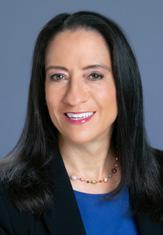
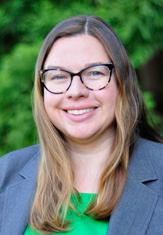
Please provide a brief profile that is 50 words or less.
MULAR: I’m a 26-year Sandy Springs resident and retired IBM executive with extensive HOA leadership experience. On Council, I’ve delivered results— improving public safety, preserving neighborhoods, expanding parks, and launching new communication channels, including a monthly newsletter residents value. I’m committed to action and results that keep Sandy Springs thriving.
OVERZAT: I’m a small business owner, educator, and therapist running for City Council to help families and neighbors thrive in Sandy Springs. For nearly 15 years, I’ve helped people solve problems and build lasting well-being. I’ll bring that solutions-oriented focus to City Hall, ensuring our government serves all residents and businesses.
A big topic in Metro Atlanta right now is the rising cost of living and a shortage of affordable housing. What role, if any, should Sandy Springs city government
have in promoting or restricting more affordable housing types, which may include multi-unit developments?
MULAR: As Councilwoman, I support building on Sandy Springs’ existing tools while exploring Employer Led Housing Partnerships (ELHPs). The City can offer incentives—such as fee waivers and expedited permits—to encourage employers to support workforce units. This approach leverages private investment, reduces commute times, and supports local businesses by stabilizing staffing. Importantly, ELHPs expand options without adding density inconsistent with community goals. Instead, they allow the City to set conditions— requiring strong design standards, mixed-income models, and tenant safeguards. It’s a smart, balanced way to expand affordability, strengthen our workforce, and preserve the character of Sandy Springs neighborhoods.
OVERZAT: A variety of housing options allows young families to plant roots in Sandy Springs and for our older residents to downsize and stay in the communities they love. I support improving options and still maintaining the character of neighborhoods by allowing for rezoning where agreed upon by the city, citizens, and developers. This would allow for smart redevelopment of single-family and multi-family homes. One way to achieve this is by allowing property owners to divide large single-family lots into three smaller single-family lots. This approach maintains the general character of the neighborhood while increasing the housing supply.
What is one thing you would do to help improve Sandy Springs’ schools?
MULAR: While Sandy Springs does not control schools, the City can play a vital supporting role. The relationship between Fulton County Schools (FCS) and the City has room for improvement, as experienced during the closure of Spalding Drive Elementary. I would advocate for stronger ties with FCS Board members representing Sandy Springs to build trust and create a more collaborative, mutually beneficial partnership. Together, we can address shared concerns such as housing for teachers and safe learning environments. With my business and community leadership background, I know collaboration works. Strong schools strengthen neighborhoods, boost property values, and benefit families.
OVERZAT: Sandy Springs is home to excellent public and private school options. I feel strongly that communication is key when faced with the unique needs of our schools to ensure that all students are receiving well-rounded, highquality experiences. I would call for regular meetings of the City with the Fulton County School Board, school administration, PTO leaders, and highly-engaged parents and neighbors to discuss not only current concerns but predicted future issues in order to have a high-level of preparedness. Being proactive about emerging issues will give students a better outcome rather than being reactive to sudden situations.
This seat will serve for four years. What do you anticipate will be the city’s biggest obstacle during that time, and how would you approach it as an elected official?
MULAR: The greatest challenge will be balancing the protection of neighborhood character with continued growth. As Sandy Springs matures, redevelopment pressures are rising. Residents want vibrant commercial centers and improved parks and trails, but also expect preserved tree canopy, traffic solutions, and stable property values. I will meet this challenge with proven judgment: insisting on strong design standards, community input, and fiscal responsibility while supporting smart renewal of older commercial areas. My firstterm record shows I listen, do my homework, and deliver balanced outcomes.
Over the next four years, I’ll continue guiding growth without sacrificing what makes Sandy Springs home.
OVERZAT: Sandy Springs’ greatest challenge will be managing redevelopment and protecting our environment. As we grow, we must preserve our tree canopy, reduce flooding risks, and protect green space and the Chattahoochee. I’d support low-impact development, strengthen green infrastructure standards, and expedite construction of sidewalks, paths, and trails. I’ll expand calls for public comment so that no neighbor is left wondering why they weren’t considered when a development or zoning issue was raised.
improvements and small businesses can effectively make desired changes that enhance our neighborhoods.
In April the city passed a series of ordinances affecting ways residents and visitors can interact. The votes occurred after legal concerns about the laws had been raised by residents, the ACLU and others, including this newspaper. The following month the city repealed one of those ordinances.
For those not currently in office: From your position as a resident, how did that experience inform the way you would govern if elected?
Jody Reichel and Melody Kelley: You voted against the buffer ordinance, in the minority, in April. Other council members later moved to your side when the city repealed it. What do you think sets your decision-making process apart from the other incumbents?
Rusty Paul, Andy Bauman, Melissa Mular and John Paulson: You supported the buffer ordinance after legal concerns had been raised. If elected in November, will you take a different approach to evaluate the lawfulness of city actions?
*Editors note: Rusty Paul did not vote in favor of the ordinances or the later repeal; the mayor typically only votes to break ties. When the ordinances first came before the City Council in January, City Attorney Dan Lee said it was at the behest of Rusty Paul.
MULAR: I supported the buffer ordinance because it was modeled with guidance from the ADL and reviewed by our in-house counsel, and I believed it would help improve public safety. But after hearing extensive discussion at the meeting and continued feedback afterward, it became clear more work was needed. That’s why we went back, engaged ADL and ACLU, and repealed it— showing that this Council will course-correct when necessary. If re-elected, I’ll strengthen our process with earlier legal analysis, outside counsel as needed, public work sessions, and broader stakeholder engagement to ensure ordinances are thoroughly vetted, constitutional, and transparent.
conflicting views, I would ensure that public comment was robust and leave room for compromises that not only benefit Sandy Springs citizens and businesses but also adhere to the rule of law. Good policy isn’t rushed. It’s built through trust, dialogue, and a commitment to protecting everyone’s rights.
What amenities and/or services are lacking in Sandy Springs, or your specific council district, if any? How would you approach helping if elected?
MULAR: For a city our size, Sandy Springs has a shortage of recreational amenities. We must improve and add facilities while accelerating the development of our path and trail network. I’ll champion realistic funding and partnerships to deliver the parks, paths, and recreation residents deserve to enhance daily life.
OVERZAT: District 3 residents have said they want more walkability. I’ll expedite the Sidewalk Master Plan, including the segment by the Epstein School on Colewood Way, so residents can walk, bike, and run safely. Sidewalks connect schools, parks, and businesses, easing traffic congestion. Businesses benefit from the foot traffic, too.
How has Sandy Springs managed its relationship with the Fulton County Board of Commissioners, and in what ways can the city do a better job working with those officials?
MULAR: Sandy Springs’ relationship with Fulton County is much improved. I fostered multiple relationships and was instrumental in turning the Library Reading Garden into City green space-working with Commissioner Bob Ellis, the Mayor, my Council colleagues, and nonprofits. Building on this spirit of cooperation ensures county partnerships benefit Sandy Springs families.
like stormwater runoff, silt, or tree damage. Strengthening Building and Inspections ensures staffing, oversight, and protections for residents.
OVERZAT: As I meet voters across District 3, I hear the same thing: they feel unheard and disconnected. As an educator and therapist, I know how to listen, collaborate, and solve complex problems. Our district is diverse, and we need tailored solutions that truly reflect each neighborhood’s needs. Continued from Page 9
OVERZAT: I would streamline education to residents and businesses on code enforcement so that no one is surprised to learn they are non-compliant. Having this information readily available on the city website and having regular workshops on code compliance would allow for fewer infractions and less frustration for residents and businesses.
Imagine you got a free pass to hire a new city staff member, who was the best in their field, with no financial impact from their salary. It could be creating a new role or adding to the ranks of an existing team. What would that position or department be and why?
MULAR: While City Council doesn’t hire staff, we set policy and fund priorities. I’d allocate resources for an AI Innovation Team, led by our Director of Data Strategy, Analytics, and AI Integration, to modernize permitting, streamline processes, and improve workforce efficiency— delivering faster service, lower costs, and stronger resident satisfaction.
OVERZAT: The Sustainability Manager role on city staff has been vacant nearly two years. I would prioritize hiring for this position and centering sustainable practices, like maintaining our green spaces, reducing local air pollution, keeping the Chattahoochee River clean, and working on recycling options for our residents and businesses.
While avoiding direct accusations, what sets you apart from your opponents in this race? How would life be different for a Sandy Springs resident if they elected you instead of someone else?
I’ll improve the long wait times and confusion around our permitting processes, ensuring that home
OVERZAT: As a resident, I was troubled when the city passed the buffer zone ordinance despite legal concerns raised by community members, legal experts, and civil rights organizations. If elected, I’ll consult with City staff, the City lawyer, and community groups to fully understand the implications of every ordinance. If there are
OVERZAT: Steady, early communication with the Board of Commissioners would allow for less urgency when issues arise; such as the Board’s attempts this year to increase the millage rate which would unfairly affect Sandy Springs homeowners. I’d bring preparedness on these issues so that Council can be proactive instead of reactive.
How would you work with city staff to improve code enforcement?
MULAR: While I receive typical code complaints—like tall grass or property upkeep—those are usually resolved once City resources are engaged. More impactful, and harder to address, are construction issues
MULAR: I’ve delivered results; others share priorities. I’ve funded new public safety facilities, protected and enhanced neighborhoods, and expanded direct engagement with residents. With proven experience, fiscal discipline, and responsiveness, I focus on results. Re-electing me means trusted leadership and real progress that preserve and improve life in Sandy Springs.
Please provide a brief profile that is 50 words or less.
FLYNN: I grew up in Huntsville, Alabama, as the oldest of five children, and after earning my master’s degree from Georgia Tech, I spent more than 20 years in the IT industry before founding a wellness business in Sandy Springs that has offered fitness coaching, networking events, physical therapy, chiropractic care, and massage services over the past 20 years.
HICKEY: I grew up in Atlanta. It was a great place to grow up and call home. We moved our family to Sandy Springs in 2018 for the schools and proximity to our jobs. Our 2 daughters have grown up and they are off to pursue their own dreams. I love this city on the hill, and I will work tirelessly to keep our city safe, affordable for families, and a destination for businesses. Perhaps in 10 years, my daughters could be fortunate to move back to this city and call it home for themselves.
ROBERTS: I have lived in Sandy Springs since 2007 in the Mount Vernon Woods neighborhood with my wife, Janice. I am the father of three grown children and grandfather to five. I am a Vietnam veteran and a retired police sergeant, having served with the Atlanta and Sandy Springs police departments.
SULLIVAN: I am a Georgia native, five-year resident that loves serving communities. My 22 years as an entrepreneur in Early Childhood Education has given me the skills to accomplish tasks as a member of City Council, including: growth mindset, problem solving, decision making, active listening and the importance of exceptional customer service.
A big topic in Metro Atlanta right now is the rising cost of living and a shortage of affordable housing. What role, if any, should Sandy Springs city government have in promoting or restricting more affordable housing types, which may include multi-unit developments?
FLYNN: Sandy Springs should expand housing options while protecting neighborhood character and property values. We should provide Incentives for developers to use smaller land tracts, require strong design standards and ensure new housing fits our community. Updating zoning to allow townhomes and cluster homes can increase affordability, but good design will be key— homes must blend with surroundings, include quality landscaping and avoid looking dense. We should also continue to partner with nonprofits and regional agencies to further increase options without heavy taxpayer costs. Our goal should be to balance: allowing seniors, young professionals, and families to afford living here while preserving
the quality of life and the value of our neighborhoods.
HICKEY: I agree that rising costs of living and the shortage of housing is an issue. However, it is everywhere and not just local to Sandy Springs.
The Council is responsible to manage city finances and not allow taxes, fees, or the appetite of government to make this affordability problem worse. City government should have a very limited role to attract developers to build more housing. I am a strong advocate of owner occupied housing, and let the market serve the housing needs.
Our City already has adequate regulations to ensure that new housing construction is built for our citizens to safely occupy.
ROBERTS: I support thoughtful policies that provide housing options for people at all stages of life – young professionals, families, and seniors – while ensuring infrastructure can support that growth.
The City needs to re-evaluate building and zoning regulations to allow for construction of a variety of homes, such as condos and townhomes. Maybe we can offer developers incentives for housing which would include accessible units. I understand the council will update its “Housing Needs Assessment” study and, if elected, I look forward to reviewing the study and working toward ideas that would fit with the character and values of Sandy Springs.
SULLIVAN: I am an advocate for housing that meets the needs of all residents, including seniors, young professionals, and families. Housing costs are a heavy burden, especially for essential workers like nurses, first responders, teachers, and law enforcement personnel. Sandy Springs should engage in thoughtful planning that protects our neighborhoods’ character while supporting developments that align with community needs. By encouraging multi-unit housing that fits our city’s vision, we can provide options that alleviate financial pressures without compromising quality of life. Smart, community-focused growth ensures everyone has the opportunity to live and thrive in Sandy Springs.
What is one thing you would do to help improve Sandy Springs’ schools?
FLYNN: I would propose forming a city-school advisory board of principals bringing together school leaders, city staff, and parents to identify needs and share solutions. This board could advise on safety improvements, after-school programs, and community resources while giving principals a direct voice in city planning that affects students.
HICKEY: Schools are under the control of Fulton County and there are limits at the state level.
I will advocate to get the state law changed to permit Sandy Springs to
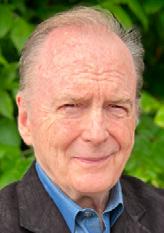



establish our own independent school system --it can be done! We established our own independent city.
In the meantime we can do the following:
1. Increase school choice - prevail on state legislators to continue to expand the “ Voucher” system for use to select the school for your child to attend
2. Encourage our PTA system to monitor, evaluate and effectuate change in our schools.
ROBERTS:
Public schools in Sandy Springs are governed by Fulton County, and the private schools are independently governed. City council has no authority to direct the operations of the schools. I applaud community volunteers and corporate engagement that I’ve heard about with nonprofits such as Sandy Springs Education Force. Their work has helped many students.
Low enrollment in some public schools is tied with other issues, such as housing and transportation. Solutions must be realistic and comprehensive. I look forward to working with the council to update the city’s Comprehensive Plan, keeping in mind the needs of our families and children.
SULLIVAN: As a City Council candidate, I recognize my role focuses on city governance and areas under our control. I believe in strong partnerships with Fulton County Schools’ leadership, principals, and PTAs, and I will be accessible for regular dialogue. I also support high-quality after-school and youth programs that provide productive, educational activities such as sports, STEM initiatives, science programs, and mentorship opportunities like Big Brothers Big Sisters. While the City Council does not set school policy, we can enhance children’s success by
providing resources, programs, and collaboration that complement our schools’ efforts and enrich student experiences.
This seat will serve for four years. What do you anticipate will be the city’s biggest obstacle during that time, and how would you approach it as an elected official?
FLYNN: One of our biggest challenges over the next four years will be managing growth while maintaining quality of life. I would enhance the use of AI and smart technologies to improve traffic flow, strengthen public safety, and guide development decisions. Combining emerging technology solutions with close collaboration with residents and city staff will ensure our growth is managed responsibly. I would also support partnerships with local businesses and nonprofits to expand services and programs. By leveraging innovation and community input, we can grow thoughtfully, protecting neighborhoods, property values, and the character that makes us special.
HICKEY: We must have the courage to do the right thing. Our City is currently a safe, affordable place to raise a family, and businesses want to invest here. We must improve all three.
We must keep our City safe and support the police and fire. This may require moving resources inside the City to this priority. Keep taxes and costs to live low.
We must engage with business and provide the environment for them to stay and grow. Why did Mercedes come here? More importantly, why did UPS leave? ALL of this can be done if we have the will.
ROBERTS: One major problem is traffic congestion. Our system of monitoring traffic needs to be a priority during peak rush hour times. Currently we know that we have most of the traffic moving west to east in the morning and east to west in the evening. Timing on the lights needs to favor these movements so that traffic can be expelled faster.
Additional remedies, such as improvements in street networks for cross-town connections and options for bicycle and pedestrian traffic would be considered with the updating of the city’s Comprehensive Plan.
SULLIVAN: Sandy Springs faces continued pressures from smart growth over the next four years, impacting transportation, schools, housing, and public services. As a council member, I would prioritize proactive planning to manage these challenges while preserving quality of life. Public safety must remain a top priority, alongside supporting the innovation economy and creating jobs that pay well.
Brought to you by –
Saint Francis School
Saint Francis School is celebrating 50 years of dedication to creating an atmosphere where students with diverse academic ability can be challenged and supported. At Saint Francis, education isn’t one-size-fits-all. Personalized scheduling ensures each student receives the structure they need to thrive, from structured literacy support to advanced honors classes. Every schedule is designed to help students reach their full potential. Small class sizes mean students are truly known by their teachers, fostering deeper learning, stronger relationships, and lasting confidence. Beyond the classroom, students are
encouraged to belong and grow through clubs, leadership roles, friendships, and creative pursuits.
The Roswell Campus’s K-8 program focuses on maximizing each student’s learning potential with an emphasis on executive functioning, and a commitment to building confident learners who are ready for success in high school, college, and beyond.
Most importantly, Saint Francis continues its rich tradition of providing a safe, supportive environment where students feel excited to learn. With bus service in Buckhead, Sandy Springs, Dunwoody, Alpharetta, Milton, and Cumming, we can impact the lives of students all over the metro-Atlanta area.
Saint Francis is one of the only
private schools in Atlanta that provides a “school within a school” dyslexia remediation program with 25 years of experience. Our Wilson reading program provides outstanding, evidence-based structured literacy instruction for students with dyslexia and other language-based learning differences.
“After 25 years at Saint Francis, it’s especially rewarding to meet former students who are now seeking the same Saint Francis experience for their own children,” said Marc Weiss, Roswell Campus Director of Admissions. “It’s validation that we are a school with a lasting impact on people’s lives.”
Saint Francis School invites families to learn more about the Roswell Campus at https://www. saintfrancisschools.com/academics/.



Brought to you by – Wesleyan School
Wesleyan School believes faith and intellect are great partners with each other. At Wesleyan, it’s not a matter of choosing faith or intellect, but rather using both to create the best possible education for your child. Our leadership and faculty work to provide students with an atmosphere that is challenging, reinforces the value of hard work, and emphasizes character and integrity above accomplishment. Wesleyan prepares students for each stage of life and provides them with the opportunity to see all the possibilities that lie before them. Wesleyan’s school motto is JOY-Jesus, Others, Yourself, and every aspect of school life is oriented to reinforce this philosophy of putting Jesus first and others ahead of ourselves.
A college preparatory environment, students have access to a wide range of academic opportunities along with athletics, arts, service and other extracurricular activities. Wesleyan’s 85-acre campus provides state-of-the-art academic facilities along with on-campus practice space for athletics and arts.
Located just outside of I-285 in Peachtree Corners, Wesleyan enrolled 1,206 students in grades K-12 for the 2023-2024 school year. Wesleyan offers bus routes throughout the metro Atlanta area. Supervised care before school is included in the cost of tuition and after care is available (K-8) until 6 p.m. at an affordable rate.
The Wesleyan School 5405 Spalding Drive, Peachtree Corners, GA 30092 770-448-7640
https://www.wesleyanschool.org/





Brought
Academy
Eaton Academy offers multiple programs, both in person and online, since a “one size fits all” approach to education is not effective in today’s world.
Academic programs
The full-day K-12 school with its 5:1 studentto-teacher ratio allows instructors to address the individual learning styles of both neuro-typical and neuro-diverse students. Using STEAM-related activities and multisensory instruction, students of all abilities achieve academic and personal success. The collegeprep curriculum is delivered in a safe, nurturing environment.
For students with more significant needs, the Pace Program customizes the curriculum to, not only meet their specific academic needs but also develop life skills and independent living strategies. This approach is perfect for students on the spectrum, those with developmental delays, and individuals with other scholastic challenges. Pace students follow the traditional school day and work to develop greater self-sufficiency and independence, on their way to earning a high school diploma.
The Independent Study Program (ISP), tailored to students’ schedules and academic needs, permits individuals to work at their own pace. The tutorial setting enables students who need a more flexible approach, such as aspiring athletes and performers, to work toward graduation while following their dreams. Some students enroll in ISP to accelerate their scholastic
A Challenging Approach to Education that Features:
• Programs for Traditional & Neurodivergent Learners
• Attention to Individual Needs
• Customized College-Prep Programs for K-12
• 5:1 Student: Teacher Ratio
• Independent Study Classes
• Supportive, Nurturing Environment
• Post-Graduate Options Available

work; others seek academic remediation. ISP arranges the one-to-one sessions on a schedule that accommodates the students’ needs for flexibility in time or delivery. Sessions can be in person or online.
LEAP is designed to help individuals strengthen their life skills to achieve greater independence. Participants benefit from job readiness training at local businesses and life skill development in our model apartment.
The LIFE program works with young adults living in their own apartments. Participants meet with a LIFE coach several times each week for support in areas such as meal-prep, budgeting, hygiene, roommate relations, and housekeeping.
Supported employment prepares young adults for the workplace. Assistance is given with resume writing, applying for positions, and keeping a job. A job coach serves as a liaison between the participant and job sites.
The College Foundations Program (CFP) is designed for individuals who completed high school but are not ready for college or to live on their own. CFP enhances students’ abilities in academics, social settings, independent living, and employment. Students receive onthe-job experience and academic enrichment to enable them to enter college and live independently.
Eaton Academy is the ideal place for families to discover education options and independent living solutions. Whatever students need, Eaton works to create the perfect education solution for them.



By balancing growth with investments in infrastructure, schools, housing, and economic development, we can ensure Sandy Springs remains a safe, vibrant, and attractive city. Thoughtful, forwardlooking strategies will allow us to meet the demands of a growing population while protecting what makes our city special.
In April the city passed a series of ordinances affecting ways residents and visitors can interact. The votes occurred after legal concerns about the laws had been raised by residents, the ACLU and others, including this newspaper. The following month the city repealed one of those ordinances. For those not currently in office: From your position as a resident, how did that experience inform the way you would govern if elected?
FLYNN: That experience showed me the value of listening and careful review before passing laws that affect residents. If elected, I would engage the community early, consider input from residents, legal experts, and advocacy groups, and work closely with city staff to assess both legal and practical impacts. Transparent communication about intent and consequences would be a priority. By fostering thoughtful, inclusive policymaking, I aim to prevent conflicts, build trust, and ensure Sandy Springs’ ordinances reflect community values and legal standards—creating fair, effective governance for everyone.
HICKEY: I support the reform. It is required in order to allow the City to conduct its business.
For a democratic republic to thrive, there must be a transparent and accountable environment for residents, media, and elected officials to exist together. City government should be responsive to the needs of its citizens, and offer appropriate opportunities for these constituents to engage. There should also be sensible controls over hyper energized special interests from dominating the discourse. Who wants to serve if they are going to be harassed?
ROBERTS: The ordinance was meant to quell the anti-Semitic hate notes thrown into neighborhood driveways and anti-Semitic slogans at protest meetings. The intention was to protect residents and give law enforcement the tools they needed if a situation became volatile. The council was right to repeal the ordinance because the wording was in violation of the first amendment.
listen to expert advisors, and vote to best serve our citizens.
SULLIVAN: I believe in the Constitution and the First Amendment: every citizen has the right to free speech and open debate on issues affecting our community. While I oppose hate, bigotry, or intimidation, I do not believe restrictive ordinances are the solution, especially when they fail legal review. The buffer ordinance was repealed for a reason, and I appreciate leaders like Jody Reichel who recognized this. If elected, I will ensure city actions comply with the law, respect citizens’ rights, and focus on policies that genuinely protect our community without overreach, fostering an environment of fairness, safety, and open discussion.
What amenities and/or services are lacking in Sandy Springs, or your specific council district, if any? How would you approach helping if elected?
FLYNN: We lack recreation options and safe neighborhood connections as well as quality restaurants and entertainment in the North End. If elected, I’ll prioritize expanding parks, sidewalks, and North End redevelopment while partnering with businesses and nonprofits. My goal is a district that’s more livable, connected, and welcoming without losing neighborhood character.
HICKEY: There needs to be more organized opportunities for young people, children, and families. I will find a way to say “yes” to ways to open these opportunities.
ROBERTS: We need public transportation which gets people to needed resources such as medical care or grocery stores without relying on Uber or a taxi. Maybe we need a system of shuttle buses to and from key areas. Let’s find a way to make it easier to live here.
SULLIVAN: I would like to see continued investments in our parks and green spaces, which enhance quality of life. I will listen to resident input as we plan projects, ensuring improvements reflect neighborhood needs while maintaining the beauty, safety, and recreational opportunities that make Sandy Springs a great place to live.
How has Sandy Springs managed its relationship with the Fulton County Board of Commissioners, and in what ways can the city do a better job working with those officials?
to vote in county elections and share any concerns with me, so I can advocate effectively.
HICKEY: There is an vs. them, and that needs to change. I would work to meet them regularly, get to know and understand them, and work towards common ground of keeping Sandy Springs great.
ROBERTS: Some zoning issues come from decisions of the county, making it difficult now to mold the city structure that best serves our residents. Commercial properties zoned by the county can be bought and redeveloped without development plans coming before the council. I would work for a good relationship going forward.
SULLIVAN: Strong relationships with the Fulton County Commission and Georgia State Legislature are critical. In 2026, new commissioners will be elected, and I will engage with leaders across parties, monitor legislation, and regularly meet with officials to advocate for policies and resources that strengthen Sandy Springs and support the needs of our residents.
How would you work with city staff to improve code enforcement?
FLYNN: I would work with city staff to review how code enforcement is tracked and implemented, then identify and apply needed process improvements. I’d also meet with HOA boards and neighborhood groups to gather input, ensuring enforcement is consistent, fair, and responsive to community concerns.
HICKEY: I am hard wired as a team player, and I would work with City manager through the chain of command system.
ROBERTS: I would like to review all the code ordinances to see which are redundant, and what parts can be eliminated to make the relationship between the public and code enforcement better than it is now. We want a cooperative model of code enforcement and a system that’s easy to navigate.
SULLIVAN: Code enforcement is vital to preserving community quality and beauty. I will work to ensure staff act proactively and promptly on inspections and reported violations. Repeat offenders, slumlords, and neglected properties must be held accountable, while residents are educated about their rights, reporting procedures, and the city’s codes and ordinances.
and use those insights to define the role’s scope. This position would leverage technology to improve traffic, public safety, code enforcement, and city services, bringing top-tier expertise to enhance efficiency and residents’ quality of life. I would also recommend piloting these innovations as part of the North End development, using the area as a testbed for smart city solutions that can later be scaled across Sandy Springs, demonstrating practical, community- focused improvements in real time.
HICKEY: I would hire as many Police officers on the ground as we could afford. Safety is like oxygen. You don’t appreciate it until it is not there.
ROBERTS: Free pass or not, the only person with the power to hire or fire city staff is the City Manager, and only after review. I believe the city functions very well with the current staff and I would not make any changes. Our current city manager is top notch.
SULLIVAN: While Sandy Springs staff do an excellent job, I would consider adding an economic development position focused on attracting international businesses, promoting tech innovation, and evaluating AI’s impact on local government. This role would help ensure Sandy Springs remains forward-thinking, competitive, and prepared for rapid technological and economic changes.
While avoiding direct accusations, what sets you apart from your opponents in this race? How would life be different for a Sandy Springs resident if they elected you instead of someone else?
FLYNN: My career as an IT Project Manager and Sandy Springs business owner as well as the President of two HOA’s has centered on process improvement and consensus building. I excel at making life more productive through teamwork. Residents can expect their concerns addressed quickly and intelligently, with practical solutions that improve our daily lives and strengthen our city services.
HICKEY: I believe Sandy Springs greatest asset is its school system, including both public and private. There is already a deep working relationship amongst these schools. I am committed in helping those schools succeed and be centers of excellence. Schools are the #1 driver for residents moving into areas across the state.
I’ve been attending council meetings and many city events for some time now and knocking on doors and listening to residents’ concerns. If elected, I would study a proposal, analyze the problem,
I want to ensure that Sandy Springs continues to thrive economically while protecting the neighborhoods and residential character that have been the heart of our city. See COUNCIL, Page 16 Continued from Page 11
FLYNN: I know the city’s relationship with the Fulton County Board of Commissioners can be contentious, but the political structure naturally creates that dynamic. To meet our goals, I would focus on building stronger ties through action. That means actively participating in FCBC meetings, establishing a close working relationship with the Fulton commissioner representing Sandy Springs, and ensuring our constituents are engaged. I would encourage residents
Imagine you got a free pass to hire a new city staff member, who was the best in their field, with no financial impact from their salary. It could be creating a new role or adding to the ranks of an existing team. What would that position or department be and why?
Flynn: I would study peer cities that have successfully hired a Chief Innovation Officer to lead smart city initiatives
ROBERTS: My experience in law enforcement and public service uniquely equips me to address public safety and civic issues with informed insight and practical experience.
Continued from Page 15
SULLIVAN: My life experience, work as an entrepreneur and caregiver, and passion for Sandy Springs set me apart. I aim to serve all residents with dedication and integrity. By electing me, our community gains a council member committed to thoughtful decisionmaking, collaboration, and enhancing the city’s quality of life for everyone.
Please provide a brief profile that is 50 words or less.
DADDOW-RODRIGUEZ: Kristen Daddow-Rodriguez has called Sandy Springs home for 18 years with her husband Daniel and their two children—a seventh grader at Ridgeview Charter and a two-year-old. A dedicated community leader, she’s served on her HOA board for 15 years and volunteered with Sandy Springs Education Force for eight years, earning Board Member of the Year in 2025.
FORD: I’ve lived in Sandy Springs for 20+ years and served as President of the High Point Civic Association. With 20 years of executive leadership, I am known for strong communication, listening, and follow-through. I bring people together, activate solutions, and deliver results to solve our community’s challenges.
HUBBARD: I’m running for City Council because I believe in the future of Sandy Springs, and I’m committed to serving District 5 with transparency, dedication and integrity. Having grown up here, I understand and deeply appreciate what makes Sandy Springs such a special place to live.
A big topic in Metro Atlanta right now is the rising cost of living and a shortage of affordable housing. What role, if any, should Sandy Springs city government have in promoting or restricting more affordable housing types, which may include multi-unit developments?
DADDOW-RODRIGUEZ: Sandy Springs should actively promote diverse housing options to ensure our workforce—including first responders, teachers, and corporate employees— can afford to live where they work. This isn’t just about affordability; it’s about community stability and reducing infrastructure strain from lengthy commutes. By using strategic tax incentives and supporting wellplanned multi-unit developments, we can expand housing variety without compromising neighborhood character. A thriving middle class that lives, works, and raises families here strengthens our
tax base, reduces traffic congestion, and builds the connected community Sandy Springs deserves. Smart housing policy benefits everyone.
FORD: Sandy Springs is a city of redevelopment, and that creates opportunities to expand housing options, including much-needed workforce housing. I’ve heard from neighbors that there is a desire for more variety in housing types to serve families, young professionals, and seniors. The city has tools through zoning and planning, and the upcoming Comprehensive Plan update is the time for residents to share their priorities. We must also learn from best practices nationwide. The Housing Study now underway should consolidate these lessons and provide clear recommendations, ensuring Sandy Springs addresses rising costs while preserving quality of life for all residents.
HUBBARD: Affordable housing is a national issue that every major sophisticated city is grappling with, and the issue deserves more than 100 words. There is no silver bullet. Yes, the city must get more involved in promoting projects and clearly stating our needs as a city. We will have to stretch beyond focus groups and task forces and begin to craft a pragmatic environment to not only encourage new housing development but encourage a wide array of housing options including multifamily, single family for sale, single family build to rent and options that may be new to all of us.
What is one thing you would do to help improve Sandy Springs’ schools?
DADDOW-RODRIGUEZ: I’d improve Sandy Springs schools by tackling housing instability—a critical but often overlooked factor in student achievement. Sandy Springs Together reports over 30% of students change schools mid-year, disrupting learning, peer relationships, and academic progress. By expanding stable, affordable housing through strategic zoning and tax incentives, we help families establish roots. When students aren’t displaced mid-year, they benefit from consistent instruction, stronger teacher relationships, and community connections. Stable housing isn’t just a family issue—it’s an educational investment. Keeping families housed means keeping students thriving, which strengthens our schools and entire community.
FORD: I appreciate the teachers and staff who work tirelessly to create the positive learning environments our families deeply value. Strong schools strengthen our entire community. Either directly or with non-profits, the City can create programs that benefit all students, public and private. By expanding mentoring and leadership opportunities for middle and high schoolers, we prepare the
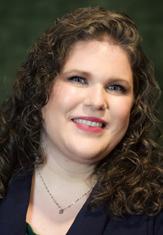

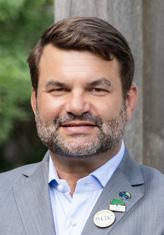
next generation for success and help set our community apart. While the City does not directly manage public schools, we can build stronger partnerships with the Fulton County School Board and advocate for the support schools need.
HUBBARD:
As a parent of three at High Point Elementary, one of our now (10) public schools, and as a member of our School Governance Council, I am acutely aware of both the successes and challenges in our schools. Our City Council lacks that kind of understanding, which became painfully obvious during the Spalding Elementary redistricting process. The school board (and to some degree our city) failed us all and voted to close the school. Understanding our schools is more than updates and advocacy, it requires rolling up our sleeves and working next to parents, teachers, administrators and faculty.
This seat will serve for four years. What do you anticipate will be the city’s biggest obstacle during that time, and how would you approach it as an elected official?
DADDOW-RODRIGUEZ: The city’s biggest obstacle will be maintaining fiscal sustainability amid rising costs and competing demands. Revenue growth may not keep pace with infrastructure needs, public safety expectations, and resident services. I’d approach this through diversified economic development—strengthening our commercial tax base while supporting small businesses. I would conduct regular efficiency audits to eliminate waste, explore public-private partnerships for major projects, and ensure we’re maximizing every dollar. I’d also build reserves for emergencies rather than relying on one-time fixes. Responsible fiscal management protects services residents depend on while keeping taxes stable.
FORD: Over the next four years, Sandy Springs’ greatest obstacle will be
balancing growth with quality of life. Rising housing costs, traffic congestion, and redevelopment pressures affect families every day. My approach is to plan proactively, listen to residents, and focus on solutions that protect neighborhoods while supporting thoughtful progress. Through tools like zoning and the Comprehensive Plan, we can guide development responsibly. Strengthening partnerships with Fulton County and regional transit agencies will also be key. By combining smart planning with transparent communication, we can ensure Sandy Springs grows in a way that keeps our community livable and vibrant.
HUBBARD: Over the next four years, managing both new development and redevelopment of existing property will be our biggest challenge. This will become apparent very quickly as we begin to update our comp-plan. This will have a direct bearing on the types of development allowed and will give our residents the best opportunity to affect the decisions that will literally shape the future of our city. Listening to residents and being direct with the real estate community is paramount. For Sandy Springs to continue to thrive, our approach to both new development and re-development must be both intentional and balanced.
In April the city passed a series of ordinances affecting ways residents and visitors can interact. The votes occurred after legal concerns about the laws had been raised by residents, the ACLU and others, including this newspaper. The following month the city repealed one of those ordinances.
For those not currently in office: From your position as a resident, how did that experience inform the way you would govern if elected?
Jody Reichel and Melody Kelley: You voted against the buffer ordinance, in the minority, in April. Other council members later moved to your side when the city repealed it. What do you think sets your decisionmaking process apart from the other incumbents?
Rusty Paul, Andy Bauman, Melissa Mular and John Paulson: You supported the buffer ordinance after legal concerns had been raised. If elected in November, will you take a different approach to evaluate the lawfulness of city actions?
*Editors note: Rusty Paul did not vote in favor of the ordinances or the later repeal; the mayor typically only votes to break ties. When the ordinances first came before the City Council in January, City Attorney Dan Lee said it was at the behest of Rusty Paul.
See COUNCIL, Page 17
Continued from Page 16
DADDOW-RODRIGUEZ: Watching council pass the buffer ordinance despite legal concerns, then repeal it, showed me the value of pausing for better legal advice and public input. As a council member, I would listen early, be transparent about legal risks, and work to avoid costly litigation. I would ensure we hear from diverse community voices, seek thorough legal review, and weigh civil liberties carefully.
This protects taxpayer dollars from litigation, builds trust, and ensures policies are both effective and constitutional.
Good governance means taking time to get it right.
FORD: As a resident, what stood out to me was how rushed the process felt. When the city enacts ordinances that affect many people, we need time to consider all sides, gather genuine community input, and carefully think through the consequences. If elected, I’ll push for a more deliberate process where residents feel heard before a vote is taken. That way, we make better decisions the first time instead of reversing course later. People want thoughtful leadership and decisions made with care, not quick fixes that require undoing. A slower, more transparent process leads to smarter outcomes and greater community trust.
HUBBARD: While I would have voted with the minority, I can understand why the council voted the way they did in April. I can also understand why they repealed part of the ordinance a month later. Representing my friends and neighbors and the City of Sandy Springs is a privilege and a responsibility I don’t take lightly. I am committed to being transparent and honest about the decisions I make, admitting when I make a mistake and working tirelessly on the solution.
What amenities and/or services are lacking in Sandy Springs, or your specific council district, if any? How would you approach helping if elected?
DADDOW-RODRIGUEZ: Managing stormwater runoff, especially in the Nancy Creek river basin, is a growing need in Sandy Springs. Aging infrastructure leads to erosion, topsoil loss, and higher insurance costs for residents. If elected, I would prioritize upgrading stormwater systems, securing funding for improvements, and implementing long-term solutions to protect homes, property values, and our environment.
FORD: Neighbors often tell me they
want more walkable parks close to home, not just destinations requiring a drive. I support pursuing opportunities for pocket parks in neighborhoods and continuing investments in existing spaces, like adding restroom facilities at Ridgeview, to make them more accessible and family-friendly.
HUBBARD: District 5 has been underrepresented and has lacked the communication we deserve for far too long. Viable, safe sidewalks and crosswalks are basic infrastructure components that have been neglected or overlooked for years. The city must provide safe and reliable infrastructure for all residents.
How has Sandy Springs managed its relationship with the Fulton County Board of Commissioners, and in what ways can the city do a better job working with those officials?
DADDOW-RODRIGUEZ: Sandy Springs can strengthen its relationship with the Fulton County Board by improving communication about county programs and services, including health care, senior services, and housing support. Recent property tax debates show we need clearer communication with commissioners about fiscal impacts. I would establish regular dialogue on shared services— schools, libraries, health, etc.
FORD: Our relationship with Fulton County directly impacts residents through services like courts, libraries, public health and trauma services at Grady Hospital. To strengthen collaboration, the city should establish a clear structure for regular liaison with the Board. This ensures consistent communication, accountability, and county decisions that reflect Sandy Springs’ priorities.
HUBBARD: As with any relationship the city has with our regional partners, we must provide clear and direct communication while being intentional in our actions. I commend the City Council’s recent efforts to protect our property tax rate and oppose any increase proposed by Fulton County.
How would you work with city staff to improve code enforcement?
DADDOW-RODRIGUEZ: I would prioritize voluntary compliance through proactive education and assistance, addressing issues before they escalate. Code enforcement should focus on helping residents understand requirements, reserving punitive measures for persistent violations. I’d work with staff to ensure fair, equitable enforcement while maintaining positive community relationships and fostering cooperation rather than confrontation.
FORD: Code enforcement can be improved through clear communication
with residents who file complaints. As council members work through the City Manager, I would advocate for consistent updates on complaint status and resolution steps. This transparency builds trust, helps residents understand the process, and ensures accountability in enforcement.
HUBBARD: Before we do anything, we must enforce the codes that are in place today. For far too long we have seen obvious violations go unaddressed. It is imperative that the consequence provides the motivation for a property owner to correct the violation. If unchecked, the problem will only worsen.
Imagine you got a free pass to hire a new city staff member, who was the best in their field, with no financial impact from their salary. It could be creating a new role or adding to the ranks of an existing team. What would that position or department be and why?
DADDOW-RODRIGUEZ: I’d hire a Community Engagement Coordinator to enhance communication between government and residents through social media, newsletters, and events. This role would promote transparency around council decisions, increase awareness of city services, and boost civic participation—ensuring Sandy Springs residents feel informed, connected, and empowered.
FORD: I would add a specialist to Economic Development to build our technology sector. Growing local businesses means creating highquality jobs, generating stronger tax revenues to support essential services, and fostering vibrant neighborhoods. With office space, transit access, and talent, Sandy Springs can become a community where families thrive alongside innovation.
HUBBARD: Permit czar. As someone who’s friends and neighbors ask, “what’s going on at the city”, I can attest to the frustration our residents and contractors have with our current permitting process. To hear that a contractor would rather work in the City of Atlanta before Sandy Springs is unacceptable.
While avoiding direct accusations, what sets you apart from your opponents in this race? How would life be different for a Sandy Springs resident if they elected you instead of someone else?
DADDOW-RODRIGUEZ: As a parent volunteering in our schools and 15-year HOA board veteran, I bring grassroots insight and proven consensus-building skills. I prioritize transparent communication and responsive government. Sandy Springs deserves leadership shaped by lived experience—making tough decisions,
managing budgets responsibly, and listening to residents.
FORD: My 20 years of business leadership, civic engagement, and service as High Point Civic Association president set me apart. I bring practical problem-solving skills and a collaborative, results-driven style. Residents can count on transparent communication, accountability, and smart solutions that strengthen our neighborhoods and keep Sandy Springs moving forward.
HUBBARD: I believe I have the skill set required for the next four years. Representing District 5 is more than updates and advocacy, it is about a vision for the future. My campaign is the next step in the maturation of my love for my community and Sandy Springs.
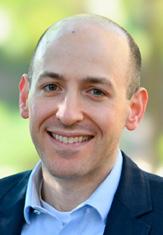
Tesula Stewart did not respond to the questionnaire.
Please provide a brief profile that is 50 words or less.
CHINSKY: I am an attorney with a public policy degree and a Leadership Perimeter graduate with four generations of my family living within 10 minutes of our home in Riverside. I am running as a “champion for our future” to ensure the next generation of City leaders keep Sandy Springs moving forward.
A big topic in Metro Atlanta right now is the rising cost of living and a shortage of affordable housing. What role, if any, should Sandy Springs city government have in promoting or restricting more affordable housing types, which may include multi-unit developments?
CHINSKY: My family undertook a housing search during COVID, so we know firsthand the challenge of finding housing in Sandy Springs. Because families and young adults lack housing options and seniors lack opportunities to downsize, Sandy Springs has lost population since 2020. While we all (even renters) desire attainable ownership opportunities, land values exceed $1 million per acre, we lack undeveloped space, and we want to preserve the character of Protected Neighborhoods. The City cannot singlehandedly change the market, but we should honestly discuss what is possible since housing outcomes improve schools, reduce traffic by shortening commutes, and boost our economy.
By HAYDEN SUMLIN hayden@appenmedia.com
SANDY SPRINGS, Ga. — Lauren Locke, a Sandy Springs resident who qualified to run for the District 2 seat on the City Council against incumbent Melody Kelley, officially backed out of the race Oct. 6.
A city investigation, spurred by a local resident’s whistleblower complaint, revealed unpaid taxes in Locke’s state records. Less than a week later, the candidate announced she was withdrawing.
Locke told Appen Media her decision to drop out of the race was not due to the city’s investigation, instead citing safety concerns due to death threats, hate-filled rhetoric and sexual harassment.
The former candidate first notified the city and local media of her decision in an Oct. 3 statement.
“Given the extreme duress this has put my family under I have decided to withdraw my candidacy,” the statement says. “These choices are a reflection of way too much time and money spent.”

The decision renders Kelley as the de facto representative of Sandy Springs’ North End area, a recurring topic in mayoral forums this year.
City Councilman Andy Bauman congratulated Kelley on her second term at the Oct. 7 council meeting after confirming with the City Clerk’s Office that sample ballots for the Nov. 4 municipal election were still being finalized.
City Clerk Raquel Gonzales, who serves as election superintendent, confirmed that the city did its final ballot proofing after Locke dropped out, ensuring no extra cost to the city.
To understand what happened, Appen Media reached out to Locke and the City of Sandy Springs for comment.
A Sandy Springs spokesperson said the City Clerk’s Office notified Locke of the complaint in a Sept. 29 letter and
provided a deadline of Oct. 2 to resolve the matter.
“A review of public records found several outstanding liens for state and federal taxes,” a city spokesperson said. “Under Georgia law, a candidate for public office is disqualified from holding office unless outstanding tax debts are paid in full or are being repaid through a payment plan approved by the taxing entity or other such conditions as allowed by law.”
The spokesperson confirmed that Sandy Springs received a response to the tax inquiry before Oct. 2 but “did not receive complete documentation to demonstrate payment or an agreed-upon settlement plan for outstanding taxes.”
Less than 24 hours later, the city received the notice of Locke’s withdrawal.
“If proof of satisfaction either by payment or an agreed-upon settlement plan was not provided by the Oct. 2 date, Georgia law requires a hearing be held requiring the candidate to show cause why they should not be taken off the ballot,” the spokesperson said. “She withdrew from the election before a
hearing was noticed and scheduled.”
Locke confirmed she sent her affidavit of withdrawal to the city Oct. 6 and provided an explanation of her decision.
Her statement says she provided the city with documentation showing that the tax matter was being correctly addressed, later deciding not to provide any more, even though she had additional documents available.
“After the death threat, more hate filled rhetoric and inappropriate sexual comments occurred, Ms. Locke had enough,” the statement says. “The matter became about safety concerns for herself and her family. The tax issues are secondary compared to the threats, hate and disgusting behavior directed at Ms. Locke.”
On Oct. 8, her campaign’s Facebook page posted an update.
“So many of you have contacted me personally, and I’m grateful for the outpouring of love and support. It means so much to me and my family,” Locke wrote. “I have filed police reports regarding the abhorrent behavior that occurred during the campaign process.”
Continued from Page 17
What is one thing you would do to help improve Sandy Springs’ schools?
CHINSKY: Even though Fulton County more directly controls our schools, we can support our students and broader community by investing in programming and infrastructure.
This includes arts and after-school activities, sidewalks to get our kids to school safely, traffic management solutions to help parents with pick-up and dropoff while reducing impact to residents, and parks for our students to play.
As part of our 2027 Comprehensive Plan, we can also explore the potential for a municipal recreation center, an aquatics complex available for the Riverwood and North Springs swim teams, or–with the World Cup looming–a municipal stadium or soccer complex.
This seat will serve for four years. What do you anticipate will be the city’s biggest obstacle during that time, and how would you approach it as an elected official?
CHINSKY: Georgia law requires cities to have a Comprehensive Plan updated every 10 years. We must engage our full community to develop our next Plan due in 2027—which will guide Council’s decisions for a decade, prioritize billions
of dollars of investment, and answer the question, “what kind of City do we want to be?” As a millennial parent with family in Sandy Springs from ages 2 to 92, I would invite conversations about the Plan across generational lines. I also support a scientific survey seeking objective input from all constituents, including residents who may not have capacity to attend Council meetings.
In April the city passed a series of ordinances affecting ways residents and visitors can interact. The votes occurred after legal concerns about the laws had been raised by residents, the ACLU and others, including this newspaper. The following month the city repealed one of those ordinances. For those not currently in office: From your position as a resident, how did that experience inform the way you would govern if elected?
CHINSKY: This experience would impact my governing approach in two ways. First, it highlights the importance of fully understanding proposed ordinances that come before Council. As the only attorney running for any of the City Council Districts, I would lean on my experience reading case law and interpreting legislation to shape my questions, conversations, and decisions. Second, it shows Council’s ability to quickly amend or correct issues when appropriate. Unlike the slow-moving federal government, the City has flexibility to take action and, if something
needs to be changed, we can address it expeditiously.
What amenities and/or services are lacking in Sandy Springs, or your specific council district, if any? How would you approach helping if elected?
CHINSKY: Walkability remains an ongoing opportunity in District 6, especially as traffic continues to worsen. Although sidewalks are being built on Lake Forrest Drive, many neighborhoods are only accessible via car, including the Powers Ferry Landing/New Northside Drive area. I would also prioritize walkability in City Springs 2.0.
How has Sandy Springs managed its relationship with the Fulton County Board of Commissioners, and in what ways can the city do a better job working with those officials?
CHINSKY: Good relations with Fulton County benefit all residents. For example, Fulton County gifted us the Abernathy Arts Center and appeared to listen to Council’s recent resolution objecting to property tax increases. We should partner on strategic initiatives like traffic management and the proposed tax allocation district in the North End.
How would you work with city staff to improve code enforcement?
CHINSKY: Much like district attorneys set priorities across criminal prosecutions, so should Council actively set the tone for code enforcement, with the goal to
encourage good behavior. I would also ask staff to focus enforcement on issues impacting health, safety, and quality of life for residents in our neighborhoods.
Imagine you got a free pass to hire a new city staff member, who was the best in their field, with no financial impact from their salary. It could be creating a new role or adding to the ranks of an existing team. What would that position or department be and why?
CHINSKY: I would hire a visionary urban planner to support our 2027 Comprehensive Plan. For example, at the recent “Envision Perimeter” summit hosted by the Perimeter CID, Greater Perimeter Chamber, and Leadership Perimeter, such a person shared redevelopment and revitalization success stories impacting housing, environmental sustainability, and entertainment districts.
While avoiding direct accusations, what sets you apart from your opponents in this race? How would life be different for a Sandy Springs resident if they elected you instead of someone else?
CHINSKY: First, as a lawyer with a public policy degree, I am trained to interpret laws and communicate issues clearly to constituents. Second, no one on Council today has school-aged children; I would bring that diversity in life stage to engage with our community’s next generation.






1. You can click on it. 3rd sign of the Zodiac. Indian Bread.
2. Angler’s basket. Trojan War hero. 7th sign of the Zodiac.
3. 12th sign of the Zodiac. Reindeer herder. Farm building.
4. Racetrack shape. 6th sign of the Zodiac. Hermit.
5. Ump’s decision. Barber shop call. 2nd sign of the Zodiac.
6. 4th sign of the Zodiac. Brass component. ___ Lightyear.
7. Coffee order. 1st sign on the Zodiac. Greek cheese.
in My House!
1 You can click on it. 3rd sign of the Zodiac. Indian Bread
2. Angler’s basket. Trojan War hero. 7th sign of the Zodiac
How to Solve: Each line in the puzzle above has three clues and three answers. The last letter in the first answer on each line is the first letter of the second answer, and so on. The connecting letter is outlined, giving you the correct number of letters for each answer (the answers in line 1 are 4, 5 and 5 letters). The clues are numbered 1 through 7, which each number containing 3 clues for the 3 answers on the line. But here’s the catch! The clues are not in order - so the first clue in Line 1 may (or may not) actually be for the second or third answer in that line. Got it? Good luck!
3. 12th sign of the Zodiac. Reindeer herder. Farm building
4. Racetrack shape. 6th sign of the Zodiac. Hermit
5. Ump’s decision. Barber shop call. 2nd sign of the Zodiac.
6. 4th sign of the Zodiac. Brass component. ___ Lightyear
7. Coffee order. 1st sign of the Zodiac. Greek cheese


By HAYDEN SUMLIN hayden@appenmedia.com
SANDY SPRINGS, Ga. — Sandy Springs officials say they’ve received complaints every week from residents cited for speeding past one of the city’s two public high schools, North Springs and Riverwood International Charter.
City Councilwoman Jody Reichel said she knows a resident who has received 10 citations since the heightened enforcement began in April.

“Can we put speed cushions out there instead of these cameras?” Reichel asked city staff. “I feel like the company is making a lot of profit. I want, of course, our kids to be safe.”
During an Oct. 7 City Council work session, Sandy Springs officials decided not to suspend the automated photo enforcement of speeding along Heards Ferry and Dalrymple roads.
Because of high volumes, traffic calming measures are often not permitted.
Sandy Springs Police Lt. Timothy Sheffield reviewed the city’s pilot program with RedSpeed Georgia LLC and asked elected officials whether they wanted to continue it.
“We have officers that will open up the RedSpeed [portal] daily, and they will go through each and every citation,” Sheffield said. “It’s merely a civil citation that’s brought to them, and the funds can only go to local law enforcement or public safety initiatives.”
He said the program appears to have reduced crashes, and there has not been a pedestrian fatality since 2022.
The city’s existing agreement with RedSpeed, which gives the city 65 percent of profits, is set to expire in June 2026. To receive a speeding citation, the driver must be going at least 11 mph over the posted speed limit. The first offense is $75, and a second citation is $125.
Mayor Rusty Paul said the Georgia House of Representatives passed two pieces of legislation related to school zone speed cameras during this year’s session.
Both bills, HB 225 and 651, are scheduled for consideration in the State Senate early next year. One prohibits cities from contracting with firms for automated traffic enforcement, and the other limits their operational hours and fees while requiring more signage and active flashing lights.
“If we’re trying to change things now, we may have to change them again in January or February,” Paul said.
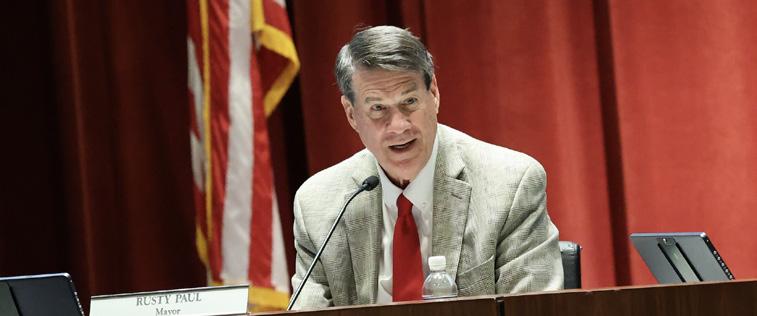
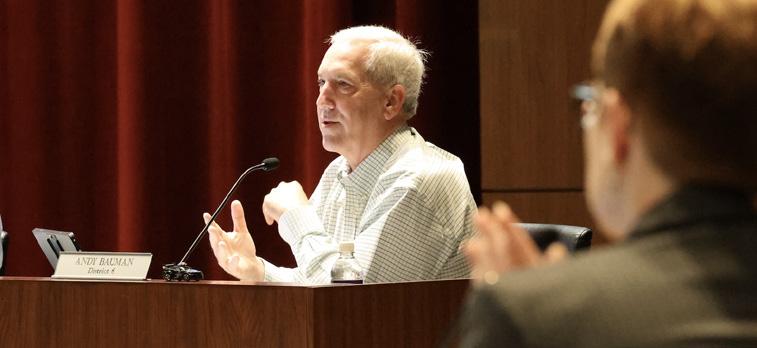
“That’s going to add more confusion to the drivers out there trying to figure out what we're doing, so a little stability until we can figure out what the Legislature is going to allow us to do might be the better approach to this.”
The Sandy Springs Police Department rolled out violator-funded traffic cameras at local high schools Feb. 10. The first citations were issued March 27.
Close to two-thirds of citations have been around North Springs High School.
From April through September, the city and RedSpeed issued 3,117 citations but denied 2,685 of them. Payments during that period total $142,570.
About 40 percent of citations are pending a court hearing or have yet to be paid.
At the Sandy Springs City Council’s Sept. 16 work session, elected officials directed city staff to put up 6-foot-by-2foot signs to warn motorists of the speed cameras.
Because of the relatively new program, elected officials and law enforcement agreed that it will take time for the community to adjust to heightened enforcement.
The sign along Heards Ferry Road details the precise photo enforcement times and speed limit.
For 60 minutes immediately before and after school starts, a 25-mph speed limit is enforced by Riverwood. During the school day, from 8:20 a.m. to 3:30 p.m., motorists can drive 35 mph.
Two weeks after okaying new signage, City Councilman Andy Bauman said he wasn’t sure they are enough to address the speeding issue.
“We need to slow down all over the city, especially near our school zones,” Bauman said. “The concern here was fair warning, due process and accuracy of the of this equipment. When I look at this picture [of the sign] that’s not what stands out to me, but it will be interesting.”
ATLANTA — Appen Media Group
Publisher & CEO Hans Appen has been selected for Georgia Trend magazine’s 2025 “40 Under 40” list. This distinction recognizes young professionals across the state who are making significant contributions in business, the arts, public service and other fields.
Continued from Page 1
City Councilman Andy Bauman, serving his third term in District 6 seat representing southwest Sandy Springs, said residents have a chance to decide their future Nov. 4.
“You deserve leadership that listens, tells the truth, acts with urgency and delivers housing options for every generation … and a city government that serves the many and not the few,” Bauman said. “After 12 years of the same tired leadership, too many things have stalled and been delayed.”
Bauman said he wants to invest more city dollars into the buildout of parks and trails around Sandy Springs, while criticizing the $7 million Veterans Park across the street from City Springs. He said the park is more of a plaza and isn’t accessible to the public with ongoing roadwork.
City Councilwoman Jody Reichel said she is running for mayor to create a city-based school district and to encourage the redevelopment of apartments into owner-occupied housing and mixed-use destinations.
“I have delivered the $180 million new North Springs High School,” Reichel said, citing her work to secure county funding. “I will finish our downtown into a vibrant, fun city downtown area like our neighbors have.”
The two candidates who ran for mayor in 2021, incumbent Paul and Dontaye Carter, briefly unified during the forum in criticizing council members Reichel and Bauman.
Carter said both council members have served their districts for at least seven years, giving them ample opportunity to pursue their own

Mary Barbaree, 86, of Alpharetta, passed away on October 5, 2025. Arrangements by Northside Chapel Funeral Directors & Crematory.
The Georgia Trend “40 Under 40” award is one of the most prestigious honors for emerging leaders in Georgia. Appen’s inclusion underscores his influence in the media landscape and his commitment to both journalistic excellence and community impact.
“I’m deeply honored to be included in Georgia Trend’s 2025 class of
‘40 Under 40,’” Appen said. “This recognition is a tribute to the talented team at Appen Media Group and the communities we serve across Georgia. I’m energized to continue pushing the boundaries of local journalism and news media innovation.”
Under Appen’s leadership, Appen Media Group has expanded its footprint
across the state, strengthening local journalism through deeper community connections and sustainable business practices. He has positioned the company as a trusted voice in independent media and a model that news organizations across the country look to for inspiration in building sustainable local journalism.
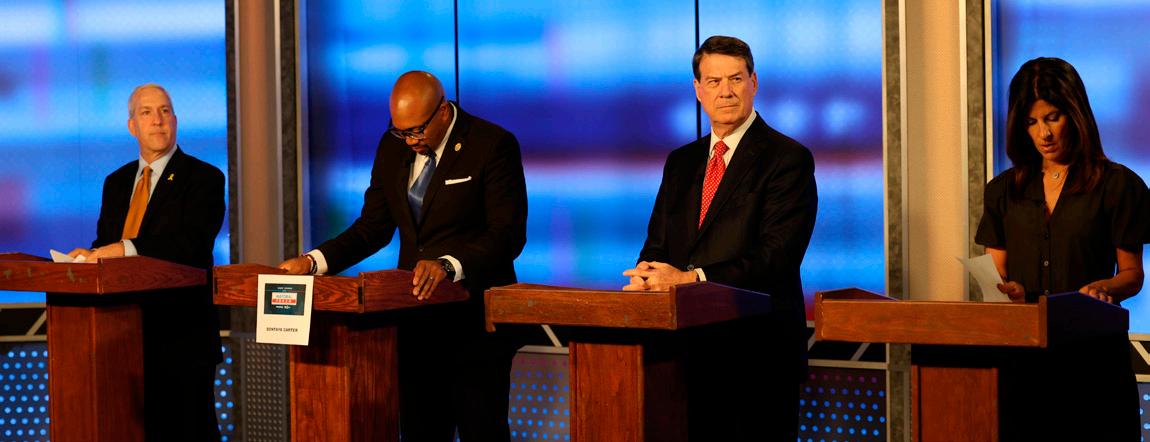
priorities as elected officials.
“I just want to remind y’all we got over 40 years combined experience, and we’re still dealing with the same problem,” Carter said. “We have two candidates on this stage that at any point during their last 12 or eight years on council could have called for a specially called meeting to push a lot of these things through.”
To drive home his point, Carter tallied up the number of days each elected official has spent in office and repeated them throughout the debate. His priorities are to involve as many residents as possible in conversations about housing and redevelopment.
Paul thanked Carter for his comments as a part of his closing statement.
“Sandy Springs was founded 20 years ago on a simple but powerful belief that neighbors should be making

Eugene Dubnik, 79, of Roswell, passed away on October 4, 2025. Arrangements by Northside Chapel Funeral Directors & Crematory.
decisions about what goes on in the community, not down at the Fulton County Commission,” Paul said. “I think in this case, past performance is an indicator … despite the criticisms that they have thrown this way, Sandy Springs is a great place to live.”
The candidates were also asked about the federal government’s crackdown on illegal immigration, which has seen U.S. Immigration and Customs Enforcement activity within the heart of the city’s Latino community at I-285 and Roswell Road (Ga. 9).
During discussion about public safety, Paul and Carter drifted apart from one another with policy.
Carter said ICE agents should not be allowed into the city without a warrant and floated the idea of signing an executive order to make the city an ICE-free zone.
“I’m the only progressive Democrat

Janelle Koff, 75, of Roswell, passed away on September 29, 2025. Arrangements by Northside Chapel Funeral Directors & Crematory.
sitting on the stage right now,” Carter said. “It’s incumbent on our mayor, on our City Council, to stand up and to do something. We’re seeing it nationwide where mayors are getting involved in this issue, because we know that rights are being broken.”
Paul said the city’s policy since the beginning has been to obey lawful orders from federal agencies. Referring to the raid off Northwoods Drive earlier this year, Paul said the Sandy Springs Police Department did not participate in the arrests of seven individuals with outstanding criminal warrants.
“Sandy Springs is a very diverse community, and we celebrate that diversity,” Paul said. “We have talked to our Police Department and made sure that they don’t do anything that puts those people who are here lawfully and living their lives in any kind of discomfort or in jeopardy.”

Rose Mitchell, 77, of Roswell, passed away on September 30, 2025. Arrangements by Northside Chapel Funeral Directors & Crematory.







Bilingual (English / Spanish) Donor Operations
The Bilingual (English / Spanish) Donor Operations Supervisor (Full-time) manages the donation door process and delegates tasks to staff, volunteers, and community service workers. As the face of NFCC, they provide excellent customer service while greeting donors and ensuring donations are properly removed from vehicles and sorted in designated areas. They are responsible for maintaining the security of merchandise and keeping all areas clean and organized.
The Supervisor must be able to lift up to 75lb frequently and be on their feet most of their shift. They must enjoy staying busy, training and influencing others to work as a team in a professional manner. Must have the ability to work Tuesday through Saturday 9am – 5pm. An extraordinary Total Rewards Package is included with this opportunity!
If this sounds like the role for you, we’d love to hear from you! Please submit your resume to jobs@nfcchelp.org

Spanish)
NFCC is seeking a Truck Driver (Donor Operations Services Associate II) to join our Facilities team.

ESL Contractor Instructor (Evening)
Our Truck Driver collects scheduled donations from businesses, residential locations, and special events while serving as a key point of contact for donors to coordinate pickup appointments. As the face of NFCC during donor interactions, this role requires maintaining a professional and a welcoming presence that reflects the organization’s values. Additionally, this position contributes to facility maintenance operations as needed.
The Bilingual (English / Spanish) Donor Operations Supervisor (Full-time) manages the donation door process and delegates tasks to staff, volunteers, and community service workers. As the face of NFCC, they provide excellent customer service while greeting donors and ensuring donations are properly removed from vehicles and sorted in designated areas. They are responsible for maintaining the security of merchandise and keeping all areas clean and organized.
The Truck Driver works Monday through Friday 9am – 2pm and periodically on Saturdays or Sundays for special events.
The Supervisor must be able to lift up to 75lb frequently and be on their feet most of their shift. They must enjoy staying busy, training and influencing others to work as a team in a professional manner. Must have the ability to work Tuesday through Saturday 9am – 5pm. An extraordinary Total Rewards Package is included with this opportunity!
If you have 1-2 years of Box Truck delivery experience, maintain a valid Ga Driver’s License free of any traffic violations for the past 3 years and enjoy providing excellent customer service, we’d love to hear from you! Please submit your resume to jobs@nfcchelp.org
If this sounds like the role for you, we’d love to hear from you! Please submit your resume to jobs@nfcchelp.org
NFCC is seeking an Evening ESL Contractor Instructor to teach English classes through our Adult Education program, serving students throughout North Fulton and surrounding counties. Our ESL Program runs three sessions annually, with comprehensive lessons covering speaking, listening, reading, and writing skills, along with regular assessments to track student progress.
The Bilingual (English / Spanish) Donor Operations Supervisor (Full-time) manages the donation door process and delegates tasks to staff, volunteers, and community service workers. As the face of NFCC, they provide excellent customer service while greeting donors and ensuring donations are properly removed from vehicles and sorted in designated areas. They are responsible for maintaining the security of merchandise and keeping all areas clean and organized.
We’re looking for an instructor who is available to teach evening classes. The ideal candidate will be committed to maintaining strong enrollment of at least ten students per class and who can create an engaging learning environment that supports adult learners in achieving their English language goals.
The Supervisor must be able to lift up to 75lb frequently and be on their feet most of their shift. They must enjoy staying busy, training and influencing others to work as a team in a professional manner. Must have the ability to work Tuesday through Saturday 9am – 5pm. An extraordinary Total Rewards Package is included with this opportunity!
If you have a bachelor’s or master’s degree in TESL, TESOL, English with a TESL certificate, linguistics or applied linguistics with a TESL certificate, we’d love to hear from you! Please submit your resume to jobs@nfcchelp.org
If this sounds like the role for you, we’d love to hear from you! Please submit your resume to jobs@nfcchelp.org





